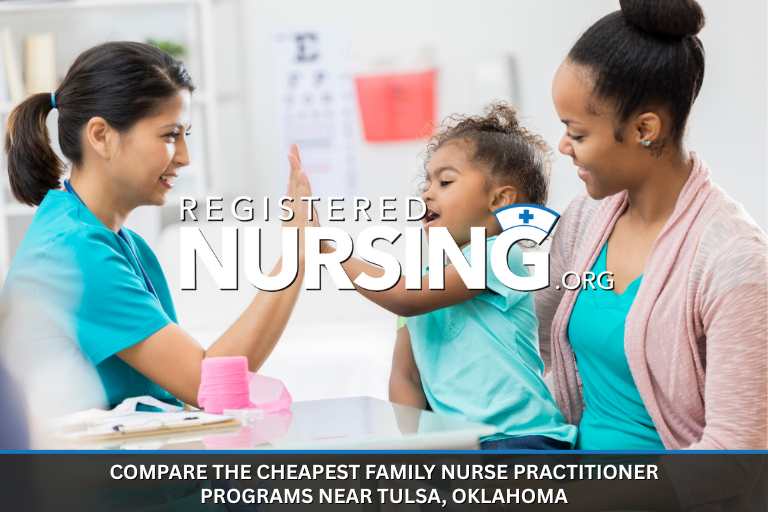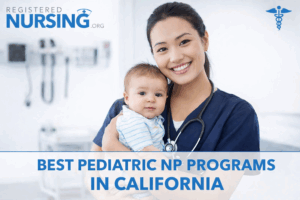Discover Affordable Family Nurse Practitioner Programs Near Tulsa, Oklahoma
- 2026 Economical Family Nurse Practitioner Programs Near Tulsa, Oklahoma
- Tulsa as a Center for FNP Education
- Breaking Down FNP Program Costs in Tulsa
- Cost-Saving Pathways for Aspiring FNPs
- Clinical Training Opportunities in Tulsa
- Smart Financial Strategies for FNP Students
- Tulsa's Job Outlook for Family Nurse Practitioners
- Choosing the Right Program Beyond Price
- Moving Forward in Tulsa's FNP Landscape
- Sources
- Latest Articles & Guides

Family Nurse Practitioners (FNPs) are essential in meeting primary care needs, especially in states like Oklahoma where provider shortages remain a challenge. According to the U.S. Bureau of Labor Statistics, nurse practitioner employment is projected to grow 45% from 2022 to 2032, much faster than the average for all occupations. This growth is driven by an increased emphasis on preventive care and the need for accessible healthcare in both urban and rural communities.
Tulsa, Oklahoma, offers a favorable environment for aspiring FNPs. The region combines affordable living, a supportive healthcare network, and a variety of training options, making it possible to pursue an advanced nursing degree without incurring excessive debt. By understanding program structures, local clinical opportunities, and financial strategies, prospective students can find pathways that are both budget conscious and career enhancing.
2026 Economical Family Nurse Practitioner Programs Near Tulsa, Oklahoma
University of Tulsa
Tulsa, OK - Private 4-year - utulsa.edu
BSN to MSN - Family Nurse Practitioner
Campus Based - Visit Website
The University of Tulsa's Family Nurse Practitioner program offers an economical pathway for aspiring advanced practice nurses. With no GRE requirement, students benefit from reduced application barriers. The campus-based program provides affordable learning through state-of-the-art Oxley Health Sciences facilities and diverse clinical rotations across northeast Oklahoma. Featuring 1000 clinical hours and interdisciplinary training, this program prepares nurses for comprehensive primary care roles. Its affordability stems from competitive tuition rates, military-friendly status, and strategic partnerships with local healthcare institutions, making quality nursing education accessible.
- Primary care across lifespan
- Interdisciplinary clinical focus
- Human patient simulation training
- No GRE required
- Clinical sites in Tulsa/Northeast Oklahoma
- Minimum 1000 clinical hours
- Full-time program design
- Campus-based learning
- Some online/asynchronous components
- Oxley Health Sciences facility
MSN to DNP - Family Nurse Practitioner
Online & Campus Based - Visit Website
University of Tulsa's Doctor of Nursing Practice (D.N.P.) Family Nurse Practitioner track presents a cost-effective advanced nursing education option. The hybrid program design reduces traditional educational expenses by offering flexible learning modalities. Students receive comprehensive training across patient lifespans with a three-year curriculum emphasizing interdisciplinary healthcare experiences. The program's affordability is enhanced by its strategic clinical rotation approach, preparing graduates for Board Exam certification without excessive additional training costs. Notably, the program focuses on underserved population clinics, providing valuable real-world experience while maintaining economic accessibility.
- Hybrid advanced nursing program
- Clinical experiences across lifespan
- 3-year comprehensive curriculum
- Interdisciplinary healthcare focus
- Board exam preparation
Tulsa as a Center for FNP Education
Tulsa blends the resources of a metropolitan area with the close knit feel of a healthcare community. Hospitals, primary care clinics, and specialized practices in the area regularly collaborate with advanced practice nurses to expand patient access. The city's lower than average housing and living expenses can ease the financial burden on students balancing coursework with employment.
State initiatives focused on improving rural and community health further drive the demand for FNPs in Oklahoma (Oklahoma State Department of Health). For students, this means access to diverse clinical settings, from urban family medicine offices to rural outreach clinics within an hour's drive.
Breaking Down FNP Program Costs in Tulsa
The total cost of an FNP program is shaped by more than just tuition. Understanding the key cost drivers can help students budget effectively:
- Credit Hour Requirements – Programs generally range from 40 to 55 credit hours. Fewer credits can shorten completion time and reduce overall expense.
- Course Delivery Format – Fully online or hybrid programs can lower commuting and housing costs.
- Residency and Tuition Rates – Some institutions offer in-state rates to all online learners, while others differentiate between resident and non-resident tuition.
- Clinical Placement Coordination – Assistance with securing preceptors can save both time and money.
- Additional Fees – Technology, library, lab, and exam preparation fees should be included in financial planning.
| Cost Factor | Potential Impact on Budget |
| Credit Hours | Directly affects tuition totals |
| Delivery Format | Reduces travel and relocation costs |
| Residency Status | Influences per credit rates |
| Clinical Support | Saves time and possible placement fees |
| Extra Fees | Adds hidden expenses |
Cost-Saving Pathways for Aspiring FNPs
Affordable FNP programs from nursing schools in Tulsa often maintain accreditation from recognized bodies and prepare graduates for national certification. For nurses who already have a graduate degree in another specialty, post-master's certificate programs provide a streamlined route, reducing both time and tuition.
Even at lower tuition rates, additional savings can come from transferring previously earned graduate credits, choosing part-time study to spread out payments, or selecting a program that bundles course materials into the tuition price.
Clinical Training Opportunities in Tulsa
Hands-on experience is critical to developing the skills required for family practice. Tulsa's healthcare network offers rich opportunities for FNP students:
- Community clinics serving multicultural populations
- Rural health facilities with comprehensive primary care services
- Family practice units in regional hospitals
- Federally qualified health centers focused on underserved residents
These placements not only provide practical training but also help students establish professional connections that can lead to employment after graduation.
Smart Financial Strategies for FNP Students
Pursuing an FNP degree is a significant investment, but several strategies can reduce the cost burden:
- Employer Education Benefits – Many Tulsa healthcare providers offer tuition reimbursement for employees advancing their credentials.
- Scholarships and Grants – State, federal, and nursing organization awards can offset tuition (Health Resources and Services Administration).
- Loan Forgiveness Programs – Serving in rural or high need areas may qualify graduates for partial or full loan repayment.
- Flexible Scheduling – Maintaining part-time work while enrolled can help cover living expenses.
This affordability can create a stable foundation for students as they plan their educational journey, helping them focus more on their coursework and clinical training rather than financial stress. With a clear understanding of living costs, prospective students can better evaluate overall program value and determine how it aligns with their professional goals.
Tulsa's Job Outlook for Family Nurse Practitioners
The demand for FNPs in Oklahoma is strong, with opportunities across primary care, urgent care, and community health organizations. Rural communities within commuting distance of Tulsa often offer financial incentives to attract nurse practitioners, making the city a convenient base for serving both urban and rural populations.
Case in point: FNPs working in nearby counties have leveraged state loan repayment programs while maintaining a home base in Tulsa. This combination of professional reward and financial benefit underscores the advantages of pursuing advanced practice nursing in the region.
Choosing the Right Program Beyond Price
Affordability should be balanced with other key considerations that directly impact a student's success and readiness for advanced practice. Accreditation by a recognized nursing body ensures the program meets rigorous academic and clinical standards, which is essential for eligibility to sit for national certification exams. Reviewing certification pass rates provides insight into how well the program prepares graduates for these critical assessments, while experienced faculty in family practice can bring valuable real world perspectives into coursework and clinical training.
Equally important are the resources and flexibility a program offers. Access to mentorship and academic support can help students navigate challenges, strengthen clinical skills, and prepare for licensure. Flexible course schedules, especially those designed for working nurses, can make it more feasible to balance employment, personal responsibilities, and graduate studies without sacrificing educational quality.
Selecting a program that aligns with career goals while offering quality education ensures that cost savings do not come at the expense of professional readiness.
Moving Forward in Tulsa's FNP Landscape
For registered nurses in Tulsa, the path to becoming a Family Nurse Practitioner is both accessible and rewarding. The city's healthcare infrastructure, combined with a wide range of educational options, allows nurses to pursue advanced roles without facing overwhelming debt. Students benefit from a mix of clinical settings, experienced faculty, and strong community partnerships that foster both skill development and career growth. Local demand for primary care providers ensures that graduates can translate their training into meaningful, in-demand work.
By comparing program costs, exploring financial aid options, and leveraging local clinical opportunities, nurses graduating from nurse practitioner programs in Oklahoma can position themselves for long-term success in advanced practice. The combination of Tulsa's supportive healthcare environment, affordable educational pathways, and promising job market makes it an ideal place to embark on this important professional transition, offering both financial feasibility and the potential to make a lasting impact on patient care.
Sources
- U.S. Bureau of Labor Statistics: Nurse Practitioners
- Oklahoma State Department of Health
- Commission on Collegiate Nursing Education (CCNE) Accreditation
- HRSA Nurse Corps Loan Repayment Program
- HRSA Federally Qualified Health Centers
Latest Articles & Guides
One of the keys to success as a registered nurse is embracing lifelong learning. Our articles and guides address hot topics and current events in nursing, from education to career mobility and beyond. No matter where you are on your nursing journey, there’s an article to help you build your knowledge base.
Browse our latest articles, curated specifically for modern nurses.



